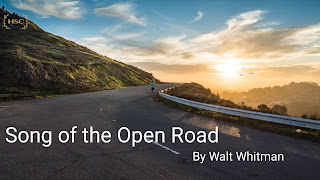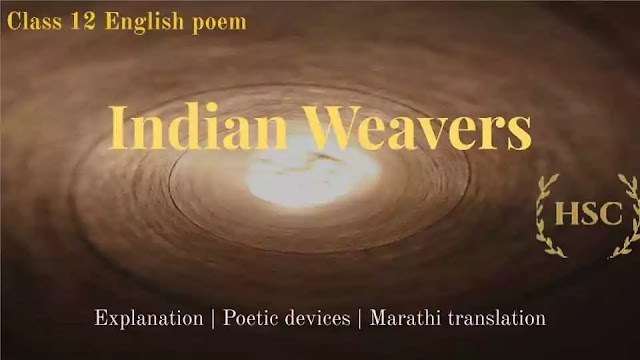Song of the Open Road: Walt Whitman
Class 12 English:
Song of the Open Road is an inspirational poem written by Walt Whitman. Throughout the poem, the poet encourages us to live life freely, though there is too much burden in our life. The poem is a fine blend of human feelings.
The poem is taken from the collection of the poem 'Leaves of Grass'. Actually, Song of the Open Road is the poem of 15 stanzas, divided into 2 sections; 1-8 and 9-15. In this article, we are going to study the first poem of the first section.
About Walt Whitman:
Walt Whitman (1819 to 1892) was an American poet, essayist, and journalist. Whitman is one of the most influential poets of America. He is often called 'The Father of Free Verse'. He grew up in Huntington in a family with difficult economic status.
His major work -
* Leaves of Grass' - (1855) Collection of poems.
* O Captain! My Captain!', - (1865) a poem written on the death of Abraham Lincoln.
Other Topics
Class 12 English poem Indian weavers
Grammar learn Tense and formation
Title :
The title of the poem is appt suitable. It represents the central idea of the poem that is freedom. The poet is representing the song that everyone should sing during their journey of life.
Line by Line Explanation:
The speaker of the poem is describing the journey which he is embarking on. Let's understand the poem deeply.
First Stanza:
In the first stanza, the speaker begins his journey.
The speaker says:
Afoot and light-hearted I
take to the open road,
Healthy, free, the world
before me,
The long brown path
before me leading
wherever I choose.
The speaker is getting ready (afoot) to start his journey on the open road. He is cheerful and open-minded, ready to experience the new world. The world is healthy and free. The road of his journey is long and brown. He will decide where the path will take him. He has all control of his journey.
Second Stanza:
The second stanza goes on with the thoughts expressed in the first three lines.
The speaker says:
Henceforth I ask not good-
fortune, I myself am good
fortune
Henceforth I whimper no
more, postpone no more,
need nothing,
Done with indoor
complaints, libraries,
querulous criticisms,
Strong and content, I travel
the open road.
In this stanza, the speaker says that he doesn't need to pray for good luck because he is pretty confident about his own capabilities. He will work hard for his bright future. So he says, " I myself am good fortune". He is neither going to delay nor complain about it. He will no longer cry or hesitate to do what he wants. He doesn't care about "querulous criticisms". He is strong and content and requires nothing. The Earth is enough to provide whatever he needs.
Third Stanza:
In the third stanza, The speaker Says:
The earth, that is sufficient
I do not want the
constellations any nearer,
I know they are very well
where they are,
I know they suffice for
those who belong to them.
Here, the poet says the earth is enough to provide whatever he needs. He does not wish for
lucky stars to help him. He also doesn't need influential or powerful people to help him. He knows they are fine where they are, and he knows they are good enough for those who belong to them.
Fourth Stanza:
This last stanza is physically separated from the rest of the poem. The use of parentheses in this stanza is a distinctive feature of the poem that makes the stanza remarkable, rather than a continuation of the central topic of the poem. It indicates his free will and independence. He does not include himself in the group of people who belong to the constellations.
The speaker says:
(Still I carry my old
delicious burdens,
I carry them, men and
Women, I carry them with
me wherever I go,
I swear it is impossible for
me to get rid of them,
I am fill'd with them, and I
will fill them in return.)
Here, the speaker admits that he also has his own burden, but instead of trying to get rid of them, he decided to carry them with him. He calls it "delicious burden". Maybe, there are wonderful attachments and relationships with burdens. He and his burdens share a symbiotic relationship of sorts: he is filled with his burdens, and in return, he fills them. The speaker is stating here that his burdens do not define him; rather, he accepts them and carries them with him wherever he goes.
Other Topics
Class 12 English poem Indian weavers
Grammar learn Tense and formation
Appreciation/ Analysis:
Theme :
The poem 'Song of the open Road' deals with many themes. The joy of freedom, self-realization, mobility, tenderness of heart, relaxation are some major themes.
Freedom:
The joy of freedom is the central idea that we discover throughout the poem. Here Whitman encourages the readers to enjoy freedom. According to the poem, Whatever trouble one is facing he has to live his life joyfully. Because in this world there is no single person who doesn't have any trouble. This is your world and you are free to choose your destiny. The theme of freedom is expressed through the metaphorical space of the open road. It is the space for everyone, Whether rich or poor. Here the poet feels being free. He is free to choose his own path. He doesn’t care about ‘querulous criticisms,’ of the people.
Self-realization:
The poem celebrates the idea of self-realization, another major theme of the poem. In our journey of life, we should be aware of our strengths and weaknesses. The speaker in the poem is aware enough about himself. He is firm on his decision about starting his journey of life, 'postpone no more.' He is strong enough and ready for the discomfort he may face during the journey. He was contented and independent. He does not have to wish or hope or pray for good fortune. The earth will provide him with anything extra that is necessary. The poet admits his weakness. He promotes mobility but he can't get rid of his own burdens that he called 'delicious'. Similarly Using the word 'I' gives the poem mood of Self- awareness.
Mobility:
Mobility is another theme, we find in the poem. The road symbolizes mobility. Whitman argues here against staying in one place. Sticking with only one place restricted one's life. One can take the road as starting point towards something new by choosing his own path.
So we must move ahead regardless of the hospitality by others. None can teach you more than what nature can.
Other Topics
Class 12 English poem Indian weavers
Grammar learn Tense and formation
Poetic devices:
Song of the open road is a narrative poem. The words like I and you give it a narrative tone. The poem is written in free verse with uneven lines. Another Poetic device, the figure of speech is frequently used. We find the example of Repetition. The word 'I' is repeated several times. Similarly, 'henceforth' 'good fortune' 'no more' these words are repeated.
Another figure of speech Alliteration is used to create the rhythm. For example 'need nothing' 'complaints - criticism'.
The next figure of speech used in the poem is the Paradox. ' Still here I carry my old delicious burdens' the poet called burdens as delicious. But how can a burden be delicious? The poet has used this combination of words to express that he has many sweet memories of people and places which he would like to remember forever. He can't leave them behind.
Then there is symbolism and metaphor in the title itself. The road symbolizes the journey of life, freedom, and mobility. It is closely related to the theme of freedom.
Hidden Message:
Through this poem, Whitman encourages us to enjoy freedom. We should move ahead continuously to test our wisdom. This is our life and we should have to decide our own path that will lead us towards our bright future. For that, we should be aware of our strengths and weaknesses. We should work hard and should not rely on the luck factor only.So schollers this is my understanding of the poem. If you have any corrections or queries please feel free to comment and like our Facebook page for the latest update.
Click here to like Facebook Page
Other Topics
Class 12 English poem Indian weavers
Grammar learn Tense and formation















8 Comments
Good mam
ReplyDeleteThank you so much, I understand it easily.😃😇
ReplyDeleteWelcome. See other posts also. I hope those also be helpful. Thanks for appreciation.
DeleteScholarly analysis....nice sir...
ReplyDeleteThanks for appreciation.
DeleteThank you for the help.
ReplyDeleteVery helpful thank you
ReplyDeleteThanks for your kind support. Line by line explanation is gr8
ReplyDelete